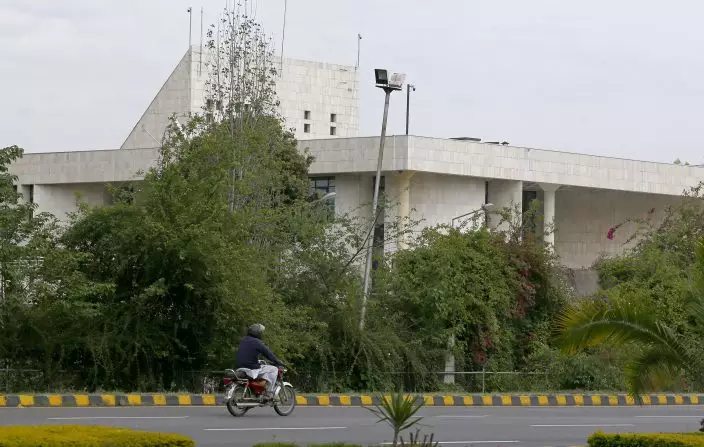The French embassy in Pakistan on Thursday advised all of its nationals and companies to temporarily leave the country after anti-France violence erupted in the Islamic nation over the arrest of a radical leader.
Saad Rizvi was arrested Monday for threatening the government with mass protests if it did not expel French envoy Marc Baréty over the publication depictions of Islam’s Prophet Muhammad.
French Foreign Ministry spokeswoman Agnes Von Der Muhll said about 400 to 500 French nationals live in Pakistan and they will be able to leave via commercial flights.

A motorcyclist rides past the French Embassy, in Islamabad, Pakistan, Thursday, April 15, 2021. The French embassy in Pakistan on Thursday advised all of its nationals and companies to temporarily leave the country after anti-France violence erupted in the Islamic nation over the arrest of a radical leader. Saad Rizvi was arrested Monday for threatening the government with mass protests if it did not expel French envoy Marc Baréty over the publication depictions of Islam’s Prophet Muhammad. (AP PhotoAnjum Naveed)
There was no immediate comment by Pakistan's foreign ministry.
The latest development comes a day after Pakistan’s interior minister Sheikh Rashid Ahmad announced his government will a ban on the Tehreek-e-Labiak Pakistan party, which is headed by Rizvi.
The arrest sparked violent protests by Rizvi's followers, who disrupted traffic by staging sit-ins on highways and later blocked roads in major cities, including the southern port city of Karachi and the garrison city of Rawalpindi.
They also staged a sit-in in the capital, Islamabad, and blocked a key road from Monday to Wednesday when police launched a nationwide crackdown, triggering clashes that killed two policemen and wounded 340 others. Three demonstrators also died in the clashes with police.
Thousands of Rizvi's followers were still rallying in Lahore, the capital of eastern Punjab province where they have a strong presence.
According to Ahmed, the country's interior minister, the Cabinet will quickly approve his proposal for outlawing Rizvi's party. At a news conference in Islamabad, he said Wednesday Rizvi's demand could not be accepted as the expulsion of the French ambassador and ban on French products could harm the country's national interest.
He asked the supporters of Rizvi to end their protest in Lahore.
Rizvi emerged as the leader of the Tehreek-e-Labiak Pakistan party in November after the sudden death of his father, Khadim Hussein Rizvi. His party wants the government to boycott French products and expel the French ambassador before April 20 under an agreement signed by it.
Rizvi's Tehreek-e-Labiak and other Islamist parties have denounced French President Emmanuel Macron since October last year, saying he tried to defend caricatures of the Prophet Muhammad as freedom of expression. Macron’s comments came after a young Muslim beheaded a French school teacher who had shown caricatures of the Prophet Muhammad in class.
The images had been republished by the satirical magazine Charlie Hebdo to mark the opening of the trial over the deadly 2015 attack against the publication for the original caricatures. That enraged many Muslims in Pakistan and elsewhere who believe those depictions were blasphemous.
Associated Press Writer Sylvie Corbet contributed from Paris.


